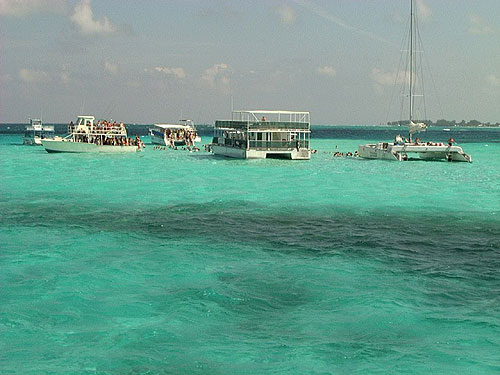15 September 2014, The Cayman Islands - "Introduction of Daylight Savings Time in the Cayman Islands - Consultation Paper", Cayman Islands Government - Ministry of Financial Services, Commerce & Environment
|
|
See Caribbean / Central America Time Zone Map with current time
The Stingray City Sandbar in Grand Cayman, Cayman Islands.
Photo © Alexander Krivenyshev, WorldTimeZone.com
|
 |
Introduction of Daylight Savings Time in the Cayman Islands - Consultation Paper
CONSULTATION PROCESS
Request for feedback and comments
This document sets out several areas for consideration in the introduction of Daylight Savings Time in the Cayman Islands. The Government’s intention to consult with the public on this matter was announced by the Premier in his 2014/15 Policy Statement, delivered in the Legislative Assembly on 26 May 2014.
This consultation is being conducted by the Minister for Commerce, Wayne Panton, through the Department of Commerce and Investment.
The Minister would like to hear from any interested members of the public, including:
- local trade associations
- religious organisations
Closing date for submissions: Thursday, 30 October 2014
OVERVIEW
Daylight Savings Time (DST) is the practice of adjusting clocks one hour forward during the longer summer months, and back again in the fall. This has the practical effect of providing more hours of sunlight in the evenings, especially in latitudes farther away from the equator. DST has been in use for more than 100 years, and was first introduced by Germany as a fuel saving measure during World War I. Currently, roughly 80 countries and territories around the world have some observation of DST.
The actual months used for DST is set as a matter of policy by governments that have implemented the practice. This varies by country, but the typical period in the northern hemisphere is either from the last Sunday in March to the last Sunday in October for European countries, or the second Sunday in March to the first Sunday in November for North America.
1. POSSIBLE INTRODUCTION OF DAYLIGHT SAVINGS TIME
There is significant debate on the advantages and disadvantages of DST. Some arguments are based on research and scientific study, but these should be taken in the context of the country in which the study was based.
The debate on the advantages and disadvantages of DST can be separated into five areas: Energy Use, Public Safety, Health, Economic Effects, and Inconvenience.
1.1 ENERGY USE
A common argument is that the extra hour of daylight that results from DST will reduce energy consumption, as there will be less use of electricity for lighting. A counter argument is that the use of electricity will increase in the darker morning hours that result from DST. A variety of studies in several countries provide some support for both sides of this argument, suggesting that the potential benefit of electricity use reduction is only a marginal benefit.
1.2 PUBLIC SAFETY
Studies in both the US and UK suggest that DST can result in small, significant decreases in traffic fatalities. However, some research has suggested an increase in traffic fatalities in the two weeks after DST starts, presumably because of persons adjusting to DST. Arguments are also made that the extra hour of sunlight decreases criminal activity, but studies in this areas have been inconclusive.
One additional concern is that school children will be arriving at school while it is still dark. This may be a concern because of potential safety issues.
1.3 HEALTH
Findings of the impact of DST on health have also had mixed results. On one hand, it can be argued that an extra hour of sunlight allows for outside physical activity and greater opportunity for vitamin D synthesis in the skin. On the other hand, risk associated with skin cancer can be increased, and studies have shown that the disruptive effect of the time transition on sleep patterns can have an impact on the incidence of heart attacks.
1.4 ECONOMIC EFFECTS
The agriculture sector has generally been against DST, as farming activity is closely aligned to the sun.
Generally, the benefits of DST on financial services and tourism are among the primary reasons that a move towards DST has been advocated for the Cayman Islands.
Financial Services
- being in sync with the large client base in New York
- eliminate some discrepancies arising in travel schedules that will make business travel simpler
Tourism
- increase the length of time that ships are in port
- stimulate shopping and dining experiences
- it would make it easier for some visitors to adapt to local time
1.5 INCONVENIENCE
The seemingly simple matter of manually adjusting clocks as well as keeping track of potentially different DST schedules across multiple jurisdictions are cited as disadvantages of DST.
Consultation questions
1. Should the Cayman Islands Government introduce daylight savings time (DST) ?
2. If DST was introduced, should Cayman follow the dates used in Europe (last Sunday in March to the last Sunday in October), or the dates used in North America (second Sunday in March to the first Sunday in November) ?
3. What advantages do you see to introducing DST in the Cayman Islands ?
4. What disadvantages to you see to introducing DST in the Cayman Islands ?
2. TIMELINE AND NEXT STEPS
This consultation will run until midnight Thursday, 30 October.
Members of the public may submit their comments at any point over this period, and will be invited to participate in online discussions through social media sites such as Twitter and Facebook.
At the conclusion of the consultation period, a summary of the consultation results will be prepared for the Cabinet and subsequently, for the public.
Back to DST News
|
|
|